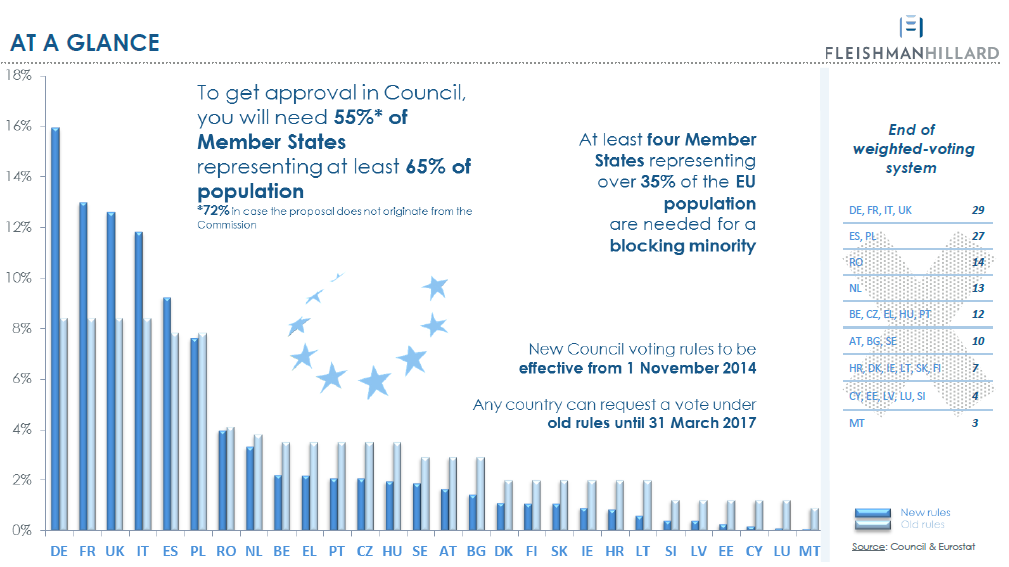In between the chaotic mid-week politics, and changing of the guard in the Commission, over the eerie quiet of a weekend in a Brussels emptied of its lawmakers, regulators and lobbyists, an equally quiet revolution took place. On 1st November, in accordance with the Lisbon Treaty, new Council voting rules were introduced to keep the ever-expanding complexity of Council of the EU meetings under control. Amidst all the institutional changes that this year has seen, this one could well be the game-changer in disguise.
Under the new rules, larger member states – namely, Germany, the UK, France and Italy – gain significantly more voting power, whilst medium-sized and smaller states lose out as voting in the Council will now be determined by population size. This means the voting weight of Germany – the largest member state – will nearly double, and the UK, almost the same, whilst medium-sized and smaller members like the Czech Republic and Belgium, nearly halve and Malta and Luxembourg see their voting weight nearly vanish.

The new rules aim to bring to a close the, at times, seemingly never ending quarrels in Council, where Member States hitherto could team up fairly easily and form a blocking minority. In its essence, these rules will mean that proposals will need 65% of the EU population’s support to pass, while 55% of Member States must be on board. So is this a conspiracy by the big member states, you ask? Ahh! No! Not really. As you will remember (or not), the political momentum way back in 2007 – before the financial crisis turned politics into dedicated “national treasuries first” strategies – was all about making Europe more democratic and transparent and this was to be reflected in the one man/woman – one vote system entering into force last weekend.
As always in European politics a few reasonable safeguards has been set, the additional requirement to have the blessing of 55% of member states is part of the eternal great trade-off between big and small in the EU.
Equally, to ease the transition from the old to the new, the safety net of the old voting rules may still be employed by any Member state until 2017. Although calling on the old rules is not going to be a free ride for the Member State(s) who does it. Au contraire; it is expected to be a highly political issue and countries that employ it will have to muster up a lot of political capital.
The new voting rules make blocking minorities harder to form. Our analysis (read full report here) shows that the ‘euro-out’ countries and Eastern European countries will no longer be able to achieve a blocking minority. However, the large Mediterranean countries can still form a blocking minority – something which could prove crucial in austerity themed debates.
So; are we going to see massive changes in how Council makes decisions from now on? Ehhh…again; No! We’re not going to see it. Our analysis of votes held in the Council over the last year show that 65% of the votes were agreed upon unanimously, and many more only saw a single member state abstain or object. And the Ministers in Council are likely to proceed in the same manner of seeking consensus and making efforts not to make a display of disagreements.
However, we are going to feel the change. It will occur in the negotiations in the working Groups before a proposal is put in front of the ministers and thus in the day-to-day compromises as voting rules are generally more an instrument in the hands of the negotiators to identify (and solve) key issues and to push negotiations forward.
Still; while in all likelihood the Council of the EU will remain a consensus building machine, these new voting rules significantly shifts the balance of power into the direction of the big 4. Whether this is a step in the right direction in terms of taking on the great challenge to close the democratic deficit in the EU, or whether it will more likely leave the governments, negotiators and especially populations of the smaller Member States even more disenfranchised from the European project, is still to be seen. Clearly the aim of those ratifying the Lisbon Treaty was the former… But so much has changed since then.
Martin Bresson, Marijn Swinters and Anne Murray and the FH Institutional Research Unit
Find Out More
-
Generative AI is changing the search game
May 8, 2025
-
The challenges facing Europe and European leaders at Davos 2025
January 24, 2025


